On Ustad Zakir Hussain's birthday today, here's an excerpt from his freewheeling interview with mid-day, where he talks about his father's magical discovery of the tabla to next-gen maestros
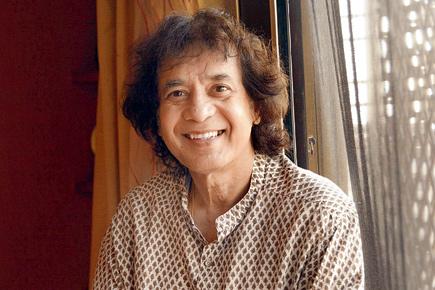
Ustad Zakir Hussain
![]() When we walk into the sea-facing apartment of Ustad Zakir Hussain at Nepean Sea Road, ahead of his annual concert Abbaji, a free celebration of music held in memory of his father Ustad Allarakha Qureshi, the casually dressed maestro comes across as uber cool and calm like the sea. When asked if we could touch his feet, he asked us if he could touch ours in return. He makes effortless conversation; moving from his father, Bollywood and Fusion to music going online, charming every person in the room.
When we walk into the sea-facing apartment of Ustad Zakir Hussain at Nepean Sea Road, ahead of his annual concert Abbaji, a free celebration of music held in memory of his father Ustad Allarakha Qureshi, the casually dressed maestro comes across as uber cool and calm like the sea. When asked if we could touch his feet, he asked us if he could touch ours in return. He makes effortless conversation; moving from his father, Bollywood and Fusion to music going online, charming every person in the room.
Excerpts from the interview
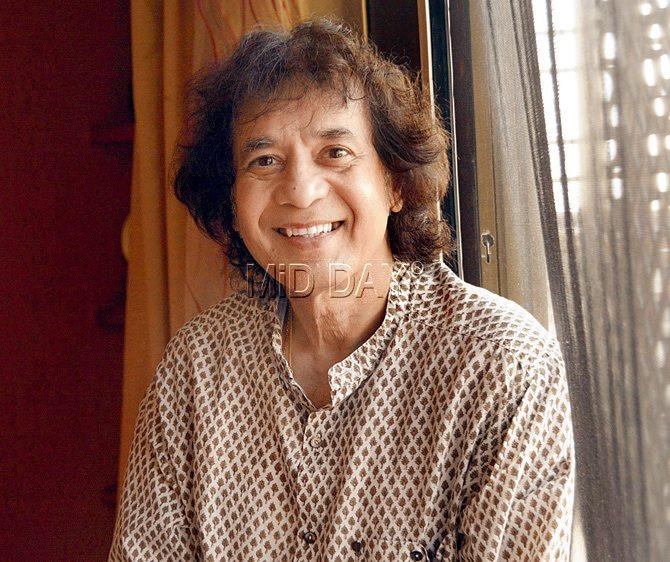
Ustad Zakir Hussain. Pics/Pradeep Dhivar
Q. Was it easy for Abbaji to choose music as a career?
A. It was easy. He just chose to run away from home at the age of 11. It was an important moment in his life. An 11-year-old running away to find a teacher was crazy.
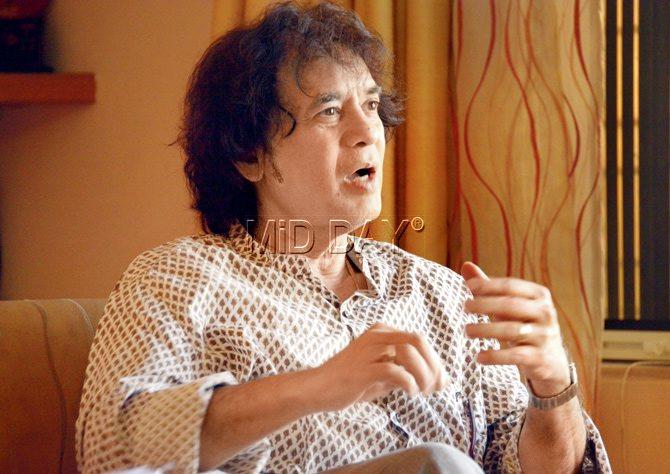
Q. What made him so sure that he wanted to play tabla? Tell us about his taleem.
A. I believe that god can make mistakes too. That's what happened here. There was a soul that was meant to be delivered into a baby who was born. The wrong address was given, so he arrived in a farmer's home. So, a miracle was required as god goofed up. As a three-year-old, Abbaji would have visions where he would see a face and hear a voice that said 'find me'. He felt an immense pull towards the tabla. When the nautanki walas came to the village, he wouldn't pay attention to the singers and dancers but only to the tabla player. He learnt from them. When he left home, he headed to the closest town, Lahore, where his uncle lived.
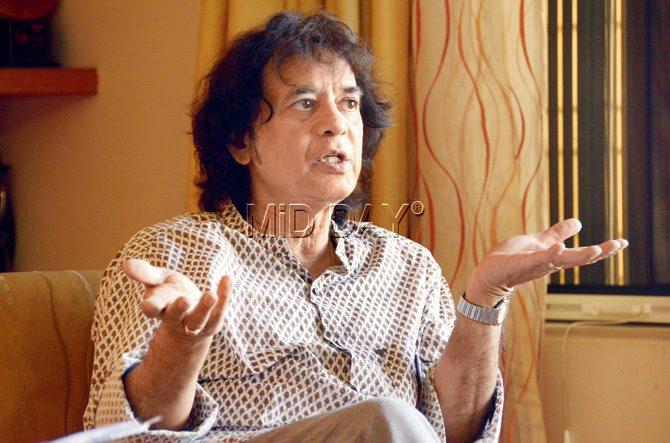
Once, he was passing by a performance where a dhrupad singer was singing, and the pakhawaj player couldn't follow his notes. Someone asked the crowd if anyone could play this, and Abbaji raised his hand. They asked, 'bachche ko aata hai?'. Abbaji was able to fill in the role, leaving everyone shocked. Someone in the crowd informed him that a tabla player called Qadir Baksh lived nearby, so, he should learn from him. When they dropped by to meet Mian Qadir Baksh, my father realised it was the same face he had seen in his vision. When Ustadji asked him who he had been learning from, and who had taught him to place his hands on the tabla, he replied that he had learnt it from him since childhood. The guru could not believe it when Abbaji positioned it perfectly. This was his 'X' factor. In Lahore's sub zero winters, they were supposed to not wear shirts, open the windows and then practice. It's called 'haath garam karna'. So, it was like a martial arts taleem.
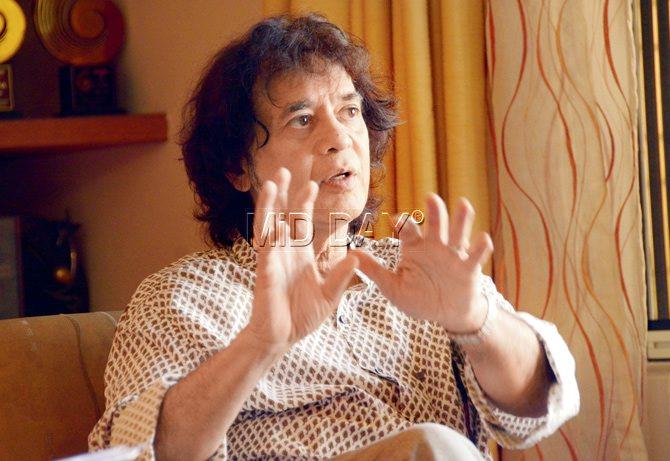
Q. You began to learn from Abbaji when you were seven...
A. He attended a school concert where I was performing. That day, he asked if I wanted to learn the tabla. When I said yes, he said, 'Great! Let's start tomorrow'. So, at 3 am he woke me up, and we sat across each other. We didn't touch the tabla. We sang rhythms to each other, talked about the great masters, their compositions, analysed and dissected them so he could open them up for me in their layers and dimensions and I could see how they were built. Most teachers ask you to write and then repeat. This was different. He wanted me to learn how to put it together instead of teaching me the music, so I could create my expression of it.
Q. Your mother wasn't too happy about your career choice...
A. Initially, yes. Musicians were second-class citizens at the time. People would ask what we did for a living apart from playing music. Abbaji would play in homes of the rich and famous, and wait in the kitchen till the musicians were summoned. They were considered uneducated; people believed that they didn't have worldly knowledge. They would invite them to perform and not to dinner. People like my father, Pandit Ravi Shankar and Vilayat Khan changed this; they were well travelled and well read, and could project themselves. It became fashionable to be at their concerts. Music got connected with divinity when Santwani and Abhangs were introduced. People from respectable families started allowing their children to study music. Today, we enjoy the fruits of their labour. I dine with the same people in whose homes I'd wait in the kitchen to play music.
Q. Did you get your idea of Fusion and jugalbandi from Abbaji?
A. He was one of the first Classical musicians to do music for Bollywood. He had access to world artistes who were part of the orchestra. He composed with them and understood their culture. Fusion music started in Bollywood — the Hindi film industry. Shola Jo Bhadke was Jazz while Eena Meena Deeka celebrated Swing music. My father was part of the force that initiated this movement.
Q. What do you think about the next generation of tabla players?
A. I am not the best tabla player. It's a fact written in stone. You may like my music but I am just one of the many good ones. There's Sabir Khan in Kolkata — he's the seventh generation tabla player. Previously, teachers would guard the secret of their gharana and jealously pass them on only to their line. Today, it is available online for all to learn. Satyajit Talwalkar, Aditya Kalyanpur, Ojas Adhiya, Anuradha Pal, Bickram Ghosh and others are names to reckon with. Girls are taking to it too; that barrier has been breached. Music is a profitable profession today; there is great young talent around.
Q. What will be the highlight at this year's Abbaji concert?
A. Sukhvinder Singh Namdhari's jodi performance. When Sukhvinder Singh was five years old, Sri Satguru Jagjit Singhji realised his potential and destiny. He taught him Hindustani Classical music and noticed his natural gift of laya and taal, and made him a disciple of the late Pakhawaj Samrat, Ustad Nihal Singh. Later in 1978, Sukhvinder studied tabla.
Q. What about music for Bollywood?
A. My father did music for over 40 films, acted in one, did playback for Prithviraj Kapoor. I enjoy it but I am a travelling musician so it's difficult to be available to a producer and director when they need me. I enjoy it but I also enjoy playing the tabla (laughs). My dad too gave up film music and chose to only play the tabla eventually.
Q. You did two films as an actor. Did you enjoy it?
A. I saw them and decided I was a better tabla player. Acting taught me how to bring the visual emotive aspect to my performances on stage.
Q. Is your family musically inclined too?
A. My wife is a Kathak dancer. One of my daughters is a filmmaker while the other is a dance teacher. She trained with Sitara Devi. All of us have performed in America together. It feels great to have such talented people in the family.
Q. People call you 'Waah Taj'...
A. All the time! The younger lot, especially.
On: February 3, 6.30 am onwards
At: Shanmukhananda Hall, Sion.
 Subscribe today by clicking the link and stay updated with the latest news!" Click here!
Subscribe today by clicking the link and stay updated with the latest news!" Click here!









